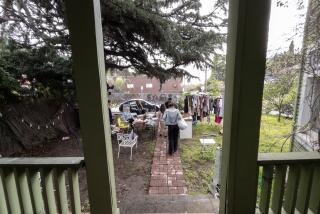A Boyle Heights cultural landmark has a vivid past and an iffy future
In 80 years, so much has happened at the cultural center known as the Casa del Mexicano.
When times were good, Mexico’s finest traveled to the giant lime- and lemon-colored building in Boyle Heights to mingle in pearls and bow ties.
When times were bad, mice ran wild, and those who ran the place fought constantly. Once, one group stormed the giant doors with a chain saw to overthrow another.
Recently, a shaggy muralist arrived to paint two arches. But he fell for the place and moved in, covering nearly every interior inch with Mexico’s history, both real and imagined.
Over time, what’s occurred in the historic center is colorful enough for a Gabriel Garcia Marquez novel.
But unless supporters find a solution fast, it’s possible this latest chapter could be its last.
The Casa del Mexicano went into foreclosure in October. On Friday, the building is set to be sold at a lender auction.
The nonprofit that runs the Casa fell behind on payments for a $175,000 loan it took out to do repairs. It also owed the county nearly $50,000 in unpaid property taxes.
The Casa’s saga has played out in the Spanish-language media for weeks as a group calling itself the Committee for the Rescue and Democracy of the Casa del Mexicano has pushed for an investigation of Martha Soriano, the nonprofit’s president, and her husband, Ruben, its secretary.
The group accuses the Sorianos of illegally obtaining the loan, operating with a phantom board, neglecting bylaws and stealing money.
Los Angeles City Councilman Jose Huizar and state Sen. Kevin De Leon (D-Los Angeles) wrote to the secretary of state and attorney general to inform them of the questions being raised.
“It’s very difficult to know the ins and outs of what’s going on,” said De Leon’s district director, Steve Veres, adding: “We have some level of concern with any institution that’s undergoing controversy.”
The Sorianos say they are victims of the bad economy and of a mix-up with the county that sent taxes soaring. They say those speaking against them are former Casa members who want to take over the organization.
They also say they have the documents to prove they have done nothing wrong.
On a recent afternoon, Martha Soriano sat in the Casa’s office and flipped through a thick binder of receipts, meeting minutes, and loan and tax documents. “From the start, we’ve been like the Flintstones, trying to make do to keep this place afloat. Now, instead of supporting us, they want to destroy everything,” she said of her critics.
The Casa’s history is long and tangled.
The organization was established by the Mexican Consulate in 1931, at a time when thousands of Mexicans were being forced to return south, blamed for stealing scarce jobs during the Great Depression. The center’s mission was to help Mexicans in need and to promote pride.
Over the decades, its prestige grew and so did donations. Thousands cycled through to take part in theater shows, sports programs, Christmas drives and the annual Miss Mexico Los Angeles beauty pageant.
But political infighting grew chronic in the 1990s, and leadership switched hands at least four times. Nearby residents began complaining about trash, drug use and loud music.
In 2002, the Sorianos were part of a group that broke into the building to oust the sitting president. They took over and elected Martha Soriano president.
In 2005, Soriano said, she asked the board’s approval in obtaining a loan for repairs. She produced minutes stating that board members wanted to keep her in place until repairs were made and the loan was paid back. Each year, Soriano said, members vote to reaffirm the decision.
But critics say her account is untrue. One of those raising questions is community activist Javier Rodriguez, who helped put them in power.
“There is no board, no advisors,” Rodriguez said.
What’s not debatable is that with the $175,000 loan came unforeseen trouble.
The name of the nonprofit was switched on the deed from Spanish (Comite De Beneficencia Mexicana de Los Angeles) to English (Mexican Benefit Corp.), which triggered a reassessment and tax increase after the county recorded it as a change in ownership.
Soriano is appealing the change to the state and county. If she succeeds in having the Casa’s nonprofit status acknowledged, the back taxes could be forgiven, county officials said. But that won’t be known until April.
By then, it could be too late for the Casa and for Frank Valderrama’s plan to start a charter school there in July, leasing space for $9,000 a month.
Brownstone Mortgage of Santa Ana plans to auction the building on Friday for a starting bid of about $280,000.
Managing Director Alex Nackoul said his company tried to help fix the Casa’s tax problems but that the Sorianos did not cooperate. He said he grew concerned as taxes piled up and the organization fell behind on loan payments.
He said he knew of fundraising events at the Casa — boxing matches, music performances and swap meets — and wondered where that money was going.
“If you’re a responsible person, you’re going to pay those taxes,” he said. “You’re going to pay your mortgage.”
According to the organization’s treasurer, Martha Velazquez, events ordinarily cover the Casa’s $7,000 monthly expenses, but lately they haven’t been bringing in as much and it’s been difficult to rent out the dance hall, a main source of income.
“I know my reputation and my work is on the line being a part of this,” she said. “But I’ve never doubted the Sorianos.”
As the auction approaches, both sides are desperately pushing to save the house.
The turmoil has not dampened the muralist’s enthusiasm. Out of wall space in the main hall, Hugo Martinez Tecoatl has moved to the basement, painting a musical tribute to Mexican greats, such as Pedro Infante.
He says he’s confident the Casa will be saved. And even if it isn’t, he isn’t worried about his murals.
“I don’t mean to brag,” he said, “but why would anyone want to touch them? If they did, I think it would create a greater controversy than we have now.”
esmeralda.bermudez@latimes.com
More to Read
Start your day right
Sign up for Essential California for news, features and recommendations from the L.A. Times and beyond in your inbox six days a week.
You may occasionally receive promotional content from the Los Angeles Times.







